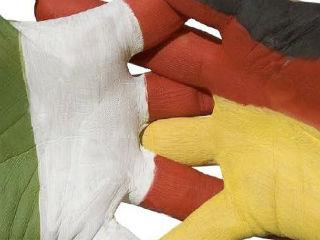From Berlin to Rome: Europe’s Latest Headache
Germany finally has a government but Italy could scupper major reforms of the European Union

Merkel can thank German President Frank-Walter Steinmeier for persuading the Social Democratic Party (SPD) to reenter the coalition, which the party had first opposed. And much credit is due to the new, youngish leaders of the SPD, Olaf Scholz and Andrea Nahles, the designated secretary general of the party. In a ballot of party members, Scholz and Nahles managed to swing around the skeptical rank and file into backing another coalition.
by
Judy Dempsey
The German public may not like it. Once again, the country will be led by the same grand coalition of conservatives and Social Democrats. It has taken five months to put a government in place after Germany’s inconclusive federal election last September. Angela Merkel is now about to begin her fourth term and soon usher in her fourteenth year as chancellor.
But it’s good news for Paris and Brussels at a time when decisive leadership will be needed over the Brexit negotiations, reform of the eurozone, and a much-needed viable migration and refugee policy.
Merkel can thank German President Frank-Walter Steinmeier for persuading the Social Democratic Party (SPD) to reenter the coalition, which the party had first opposed. And much credit is due to the new, youngish leaders of the SPD, Olaf Scholz and Andrea Nahles, the designated secretary general of the party. In a ballot of party members, Scholz and Nahles managed to swing around the skeptical rank and file into backing another coalition.
Over the past few months, unlike the conservative bloc, the SPD had some fierce internal, but also public, democratic debates over whether or not to continue the grand coalition. A younger generation of firebrand Social Democrats in their twenties wanted the party to stay out, renew itself, and become a strong and viable opposition in the Bundestag.
That outcome would have left Merkel with a minority government, which would have been unstable—the last thing Germany and Europe needed given the miserable outcome of Italy’s general election on March 4 in which populist and far-right parties gained the most votes, according to preliminary results.
Also, there was no appetite among most of the German parties— except the far-right Alternative for Germany (AfD)—for another election. The SPD is broke financially and, judging from the latest opinion polls, politically, too. And along with Merkel’s conservative bloc, the SPD would have been trounced by the voters.
In short, neither Merkel nor Nahles had anywhere to go.
It’s easy to be cynical about this new coalition, particularly since the SPD had been completely overshadowed by Merkel’s conservatives—or rather, by Merkel herself—in the last coalition that lasted from November 2013 to September 2017. This time round, it could be different.
The SPD is now led by younger people. The stables have been cleaned out. Scholz and Nahles also seemed to have brought the party together after some nasty polemics between the erstwhile leader, Martin Schulz, and the current foreign minister, Sigmar Gabriel.
And Jusos, the movement of young Social Democrats, have graciously accepted that 66 percent of the party’s 460,000 members voted for the coalition. Despite the opinion polls showing the SPD trailing the AfD, with younger people at the top, Nahles might be able to use the next four years to reverse the fortunes of the party.
The same cannot be said for Merkel’s Christian Democratic Union party or its sister party in Bavaria, the Christian Social Union. Both still have the same ageing leaders, although Merkel has gone some way to bring in a few younger people—especially women—into the party’s highest echelons.
The SPD also wants to start making policy, something it didn’t do at all during the last grand coalition or for that matter during the first one with Merkel back in 2005. And whenever it did, Merkel took the credit. This time, the Social Democrats have an agenda for Europe and a domestic one.
Nahles and company identify with French President Emmanuel Macron’s plans to reform the eurozone. However vague the coalition agreement is on Europe, there is a chance for the Social Democrats to focus on the future direction of the EU. That’s not going to be easy given the widening East-West divide and the uncertain outcome of Italy’s elections. Domestically, the SPD will focus on much-needed investments for infrastructure and digitization.
So despite the relief in Paris and Brussels that Merkel is still in charge, Germany and France now have to contend with Italy, the eurozone’s third largest economy, the world’s eighth biggest economy, and a founding member of the EU.
The center-right coalition, led by former Prime Minister Silvio Berlusconi’s Forza Italia (Go Italy!), looks set to win the most seats in the lower house of parliament but not enough to form a majority, according to exit polls.
The antiestablishment Five Star Movement is in second place and is poised to become Italy’s largest single party. The governing center-left coalition came third in a campaign dominated by intense criticism of mass immigration, high levels of youth unemployment, and growing poverty.
Indeed, as the Economist wrote in its leader about the campaign, “the country is in poor shape to withstand the next downturn. Responsible, reforming government is as badly needed as ever.”
That’s not going to happen soon. But it would be a mistake for Berlin, Paris, and Brussels to hold back on the reform of eurozone until a new and stable government is in place in Rome. With or without Italy, it’s time to rev up the Franco-German engine.
*First published in carnegieeurope.eu



 By: N. Peter Kramer
By: N. Peter Kramer

